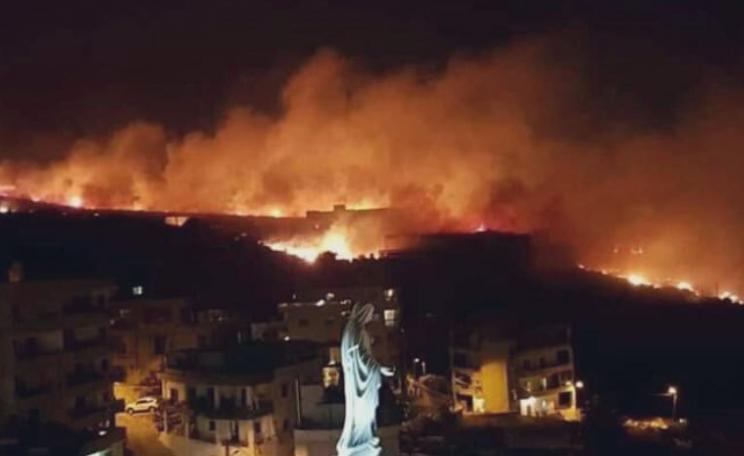-
Much of the world has been shifting away from coal. But Pakistan, one of the smallest contributors to global greenhouse gas emissions historically, is intending to burn a lot more of it in the coming years.
Less than one percent of global emissions currently come from Pakistan - but this number is likely to increase four-fold in the next decade due to its growing portfolio of coal-fueled plants.
Until three years ago, the South Asian country had just one active coal-fired plant. Today, it has nine - with more to come in the pipeline.
Energy crisis
One of these plants is a mile-wide pit that runs nearly 500 feet deep being dug by hundreds of workers in the heart of the Thar Desert, in Pakistan’s southern province of Sindh.
The project is on its way to becoming Pakistan's biggest industrial site - a $1.6 billion power project by Sindh Engro Coal Mining Co (SEMC), backed by a combination of Chinese and Pakistani companies.
The project promises to bring 3,960MW of electricity to a country that is currently facing a crippling energy crisis - nearly 25 percent of Pakistan’s 197 million population still lacks access to grid electricity - which costs the country billions per year, according to a World Bank report.
Imran Farooq, a resident of Karachi, the capital of the province of Sindh and the premier industrial and financial centre of the country, said: “We just need electricity - cheap electricity, it doesn’t matter from where.”
Karachi is also one of the world’s most polluted cities in the world. “The air is already bad, how much worse can it get? At least we can have air-conditioning we can afford during the heatwaves.”
Thar’s coal was first discovered in 1992 but because of its poor quality, it was considered too expensive to be mined and only became a less likely prospect as environmental awareness rose globally. But China has recently shown interest.
Local opposition
Shahzad Qasim, the Prime Minister’s special assistant on the power sector, has said: “Finding international financing for coal had been difficult, with China the only country willing to invest.”
China is moving away from domestic mining in an attempt to curb greenhouse gas emissions and curb climate change, but many activists have criticized the country for promoting dependence on fossil fuels in many developing countries by actively investing in their nonrenewable projects.
Currently, China is investing in 21 energy projects under the Chinese Pakistan Economic Corridor (CPEC) - an economic ‘zone’ between the two countries that started in 2015 and on its eventual completion with connect a number of countries in South and Central Asia for trade and industrial purposes. Although a number of them are wind, solar, and hydropower fueled, at least 70 percent of the nearly 14GW of power projects will be coal fired.
Asad Jatoi, an activist and environmental lawyer based in Pakistan, states that the reason there isn’t a louder national outcry about projects like the coal-fired plant in Thar, is because of the lack of awareness.
In addition, he said: “People who are most vulnerable to and most directly impacted by the project have already been voicing their complaints against the project but are completely ignored."
The past two years have seen several cases of opposition from local residents of Thar over concerns of land seizures, air pollution, fly ash contamination in wells, and displacement of communities.
Water pollution
Once construction is complete, the mine’s watery effluents will be regularly transported into a reservoir nearly 30km away.
But several villagers nearby have been protesting the construction and the potential pollutants in their sweet water wells.
SEMC has provided alternative pastures for villagers nearby as well as as new houses to relocate to and a training centre for labor jobs needed for the construction project. But many villagers are protesting the damages done to their ancestral land. The villages of Senhri dars and Thareo Halepoto, for instance, have been completely relocated.
One of the residents from Senhri dars said: “We don’t want their money, we want to keep our ancestral land.”
Several grassroots activists in Sindh have also been calling for the complete shutdown of the mining project because of how detrimental it will prove to be to the region’s ecosystem and for Pakistan’s emission rates.
Public outcry
Although Pakistan has one of the smallest contribution to global greenhouse gas emissions globally, it is among the countries most vulnerable to climate change, while also lacking the technical and economical capacity to mitigate its worst impacts.
Mohammed Khan, a member of Pakistan’s Anti-Coal Alliance, an emerging grassroots civil society campaign, said: “Pakistan is going to face the brunt of climate change and it should be prioritising adapting to changing climate conditions. Coal is disastrous to the climate and it is tragic that, as the world moves away from it, Pakistan is moving towards it.”
Anti-Coal Alliance, in collaboration with locally affected people, plans to continue protesting against the construction of coal-fired plant projects in Thar as well as others.
Khan explains that the province of Sindh province is more prone to climate change due to its geographical location and if coal projects will not just impact emissions, result in additional displacement of many of the 1.6 million local people of the desert, but will also negatively impact the ecosystem of the region.
Khan added: “We have been protesting for two years and we will continue to protest until our voices our heard by someone. Pakistan’s future cannot be coal and it is only a matter of bringing enough awareness about it to people before there is a loud enough public outcry about it.”
This Author
Rabiya Jaffery is a freelance journalist and multimedia producer covering stories from the Middle East and South Asia. She reports on climate, culture, and conflicts. She tweets at @rabiyasdfghjkl.







